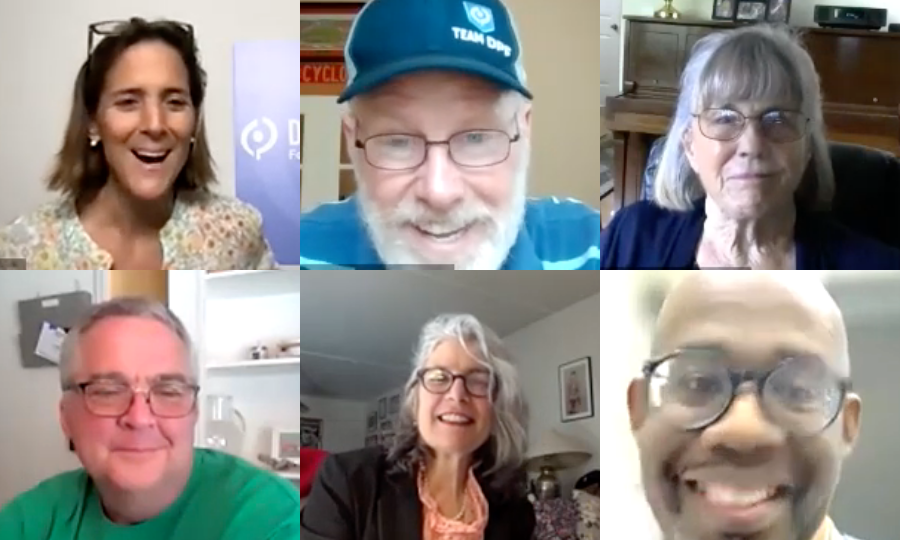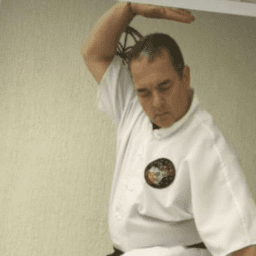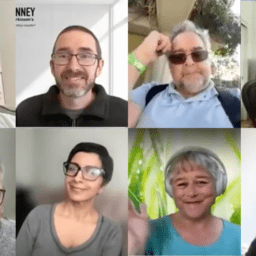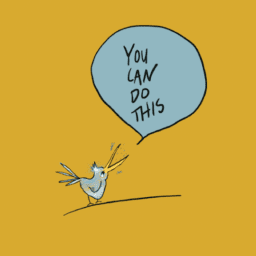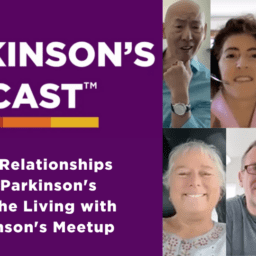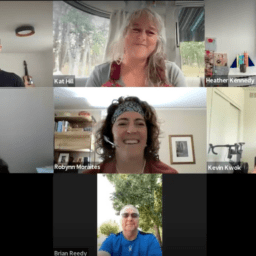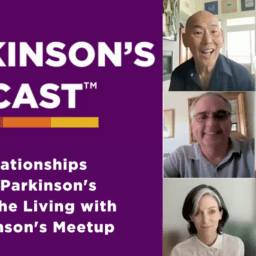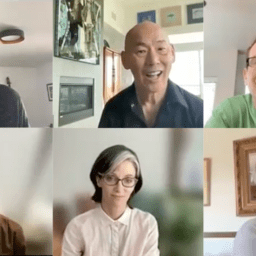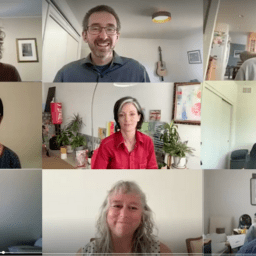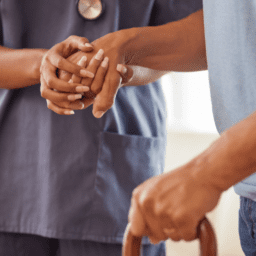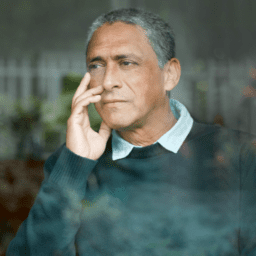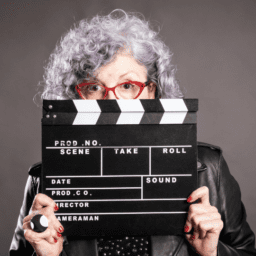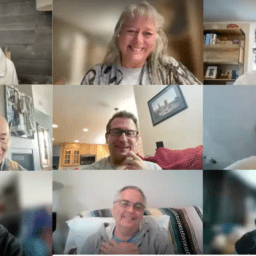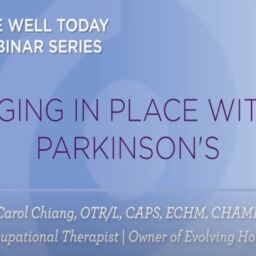Living alone while living with Parkinson’s can be a blessing or a curse. Some people love their independence and love being able to direct their days all on their own. For some, not having a live-in care partner, family member, or roommate is lonely and a hardship.
During this webinar, we talked to five people, Michael S. Fitts, Allyson Kinney, Michael Fahning, Gerrie Blavat, and Brian Reedy, who are living alone with Parkinson’s, some by choice and others not. They shared their stories and offered ideas and advice on how to live alone and well with Parkinson’s.
To download the audio, click here.
You can read the transcript below. To download the transcript, click here.
(Note: This isn’t a perfect transcript, but it’s close.)
Melani Dizon (Director of Education and Research, Davis Phinney Foundation):
My name is Melani Dizon and I’m the director of education at the Davis Phinney Foundation and today we are here for our Living Well Webinar Series and we’re going to be talking about living alone with Parkinson’s.
One thing that I want to talk about in terms of living alone is that some people will say, I’m single and living with Parkinson’s, or I live alone, and what we’re really focusing on right now is people who live in their home, by themselves. They might not necessarily be single, maybe they have a partner who lives in another place, but we’re talking about people who live by themselves. No roommate, no family member, no spouse, no partner, because we really want to talk about what those challenges are. So, it has nothing to do with relationship status. It has to do with your living situation.
And then I also want to just thank our peak partner sponsors today, we have four peak partners, and these are companies that are invested in the Davis Phinney Foundation and what we do, globally. They get to sponsor, not just our webinars, but our EVC, our Every Victory Counts manual, a lot of the content that we create on our blog, these are people that we collaborate with greatly. Those sponsors our peak partners are Adamas, Amneal, Lundbeck, and Sunovion. We’re so grateful to them to be able to host these webinars and have amazing people on, so thank you so much to our sponsors.
Okay, let’s get started we have so much to talk about. This is a fabulous topic. We’ve had so many people ask us why are we not covering this topic, there’s so many people that are living on their own and they feel a little bit left out of the conversation you know especially when care partner topics get brought up because they’re their own care partner and they’re not really addressed so looking forward to talk about this.
Somebody is asking real quick how do I turn off closed captions? There should be a little arrow on the bottom of your dashboard your zoom dashboard, it says CC and if you click that little arrow, you’ll see something that says hide subtitles so you can just click that, and it’ll turn off.
Okay, we were supposed to have another person on the panel, and I really hope she shows up, she’s having a little bit of trouble with the zoom link, so we hope to welcome her in a minute but, don’t worry if someone pops up in the middle.
Okay, so, I’d love to go around, and we’ll start with Allyson, and if you could just tell us your name, where you live, how long you’ve been living with Parkinson’s, why this is an important topic to you and why you said yes when I reached out and then also like how long have you been living alone with Parkinson’s? So, if you happen to have been diagnosed when you were with somebody and then, you know, now you’re living alone. So, go for it Allyson.
Allyson Kinney (Davis Phinney Foundation Ambassador):
Thank you, Mel. My name is Allyson Kinney. I live in Branford Connecticut, and I was diagnosed in 2014, which is almost eight years ago, and I was diagnosed shortly after my husband passed away.
And I felt this was a very important topic for me to participate in, because I had been living alone ever since I was diagnosed. But, having said that, I felt from the get-go that it was very important to fight. And I’ve been very very cognizant of the things that I have to be aware of in the house in order to live well with Parkinson’s, so I try to talk to other people and make that impression on other people with Parkinson’s, so that we are not having issues in the house that are caused by living alone.
So, thank you very much Mel.
Melani Dizon:
Yeah, absolutely. Thanks for sharing. Mike how about you?
Michael Fahning (Davis Phinney Foundation Ambassador and YOPD Council Leader):
My name is Mike Fahning. I’m from Minneapolis, Minnesota, I was diagnosed in 2001, 20 years ago. I think living alone sounds simple in the beginning, but it can become complicated as life goes on, so I think there’s some things that you don’t think about that you have to concern yourself with, as Allyson said, you know, trying to simplify your life and trying to just understand that, living alone can be complicated, so I’ve been living alone for six years now.
Melanie Dizon: Thank you. Brian?
Brian Reedy (Davis Phinney Foundation Ambassador):
My name is Brian Reedy. I was diagnosed with Parkinson’s in early 2011. I had my care partner Lily with me until 10 months ago, when she died from metastatic breast cancer, so we were each other’s care partner and in a way that kind of helped my Parkinson’s to be more cognitively aware but at the same time I let my physical go because it’s hard to take care of yourself when you’re taking care of someone who’s in worse shape.
And so, I’m only 10 months into this living single, but it’s interesting, Lily and I led our support group here in Carson City for years and I’ve learned so much of just what’s available in the community, what we can connect with, where I had help coming in for a while until I could make the adjustment. People coming in to help me with meals and stuff. I did Meals on Wheels or meals at the community service, community center, I mean, senior center.
So, I love sharing what I’ve learned to help others who are struggling with similar things, and I just want to be of benefit with the experiences that I’m having.
Melani Dizon:
Great, thanks so much Brian. Michael?
Michael S. Fitts (Assistant Dean for User Access and Diversity at The University of Alabama at Birmingham):
Good afternoon, everybody. My name is Michael Fitts. I’m from the great state of Alabama. I have been diagnosed with Parkinson’s ever since July 5, 2011. I also have been living alone all that time, and probably before that, because, actually you know people say that when you get diagnosed with Parkinson’s you likely have had it at least a decade prior to the diagnosis.
So, I’ve been living alone all that time. And I really think this is an important subject and I know when I originally talked to Mel about it, she was like really really excited because you know she was putting stuff together to address this particular situation. So, I’m excited to be here.
Melani Dizon:
Great. Thanks, Michael. Gerrie, glad you could join us!
Gerrie Blavat (Parkinson’s Advocate for YOPD Newly Diagnosed Women):
Thank you. Nice to see everyone, I’m Gerrie. I’m currently in Philadelphia. I am a single woman by choice, always have been. And when I was diagnosed with Parkinson’s in 2015, I was barely 50. So, and as Mike said, you have symptoms before your official diagnosis. So interestingly I was being treated for back pain, and it resolved in short order, but I had a foot drag and a weird arm swing and when I went back to my family medicine doc, the first thing he said to me,“how’s your back?” And I’m like, “the backs great, we resolved it with physical therapy and rehab and a little pain injection no problem. But watch me walk.” And then he said, “you’re onto something,” because I was as young probably as his daughter, he graduated med school the year I was born. And from there, February 3, 2015, a day that will live in my infamy, that’s what I was diagnosed, and I’m so honored to talk about this because being relatively young with Parkinson’s, the resources were geared to a different age group so I’ve been able to cultivate an early onset women’s group, support group for young women with early onset Parkinson’s, so this is great, and some live alone, some have partners, some work, some don’t work, so this is super important, so thank you I’m honored to meet all of you.
Melani Dizon:
Great. Yeah, thank you. Okay, what I’m going to start out with is really positive. What is your very favorite part about living alone with Parkinson’s? Anybody want to chime in?
Gerrie Blavat:
Having all the time in the world that I need to do all the things that you think should be easy but sometimes are difficult like bathing, grooming, dressing, buttoning, fastening, tying, and that’s even before you have breakfast.
Melani Dizon:
Right, right. So, you don’t have somebody trying to crack the whip and say, hurry up, hurry up, right?
Gerrie Blavat:
Or as a woman that cares about other people, if other people are in my space I tend to care for them. I’ll make the coffee or I’ll, you know, serve the tea or whatever happens to be going, so the freedom of time is really helpful and space.
Melani Dizon:
Anybody else want to share what they like about it?
Michael Fitts:
Well, I don’t know if I like this, but you know I go back and forth between wanting company, and then not wanting company. So, basically, after I’ve worked all day and going home, I really don’t want to have to deal with a whole lot of questions because I answer questions at work all the time.
So that sounds a bit selfish but it’s an honest answer, so I do in some instances like being single and living alone, rather.
Melani Dizon:
Yeah. So, what is it that you do, you know, people want to get a better sense of who we are, so, what do you do during the day?
Michael Fitts:
So, I work at the University of Alabama at Birmingham, specifically the UAB libraries. And so there I serve as the assistant dean for user access, which has all the services and resources that we supply our faculty, staff, and students. And then also I have a diversity appointment as well.
Melani Dizon: Great.
Gerrie Blavat:
That’s a big job Mike, you’re a busy man, no wonder why you want some downtime when you get home.
Michael Fitts: Exactly.
Melani Dizon:
Anybody else? What is the silver lining of living on your own right now?
Allyson Kinney:
Well, I will say that one of my issues is posture, and I’m always trying to make sure I’m stand up straight and not living with someone, it’s kind of funny, I don’t have anybody here to nag me to stand up straight. I nag myself; I go by a mirror, I go whoops.
Melani Dizon:
Somebody says what I like about living alone is that it motivates me to confront my challenges. I can’t just ask someone else to do what is difficult for me.
Michael Fitts:
That’s a great answer.
Gerrie Blavat:
Yeah, we all accommodate, we learn tricks, we have this way of, it’s like that grit, that perseverance, that ability to just say, “well, it’s on you, girl, you better do it.”
Melani Dizon:
Yeah, and you know one of the things we hear often from care partners is that dynamic, where, you know, “how much do I push the person to do stuff on their own, I want to help them out” and the other person says, “well the other person will do it for me” and so you know I think that that problem solving has to be very very attuned when you’re living by yourself. So, you have to learn how to get things done or you also are very good at asking. Brian, we know, you can’t go on a ladder ever again, we’re just not letting it happen and so if you need to make it happen you gotta call somebody and so it kind of helps you build that network of people outside of the home.
But I’d love to talk a little bit about the challenges of living alone. So, what are some of the things that, you know, they can be big challenges, you know, sort of the global picture, but also the things in day-to-day life where you just like, every time I make my coffee or every time, I want to do this, this is just gets in my way or it takes too long or that kind of thing.
Michael Fitts:
Well actually I have a challenge as far as like getting dressed in the morning. And the main part of that that I have trouble with is like buttoning up my sleeves. So sometimes I can do it and sometimes I can’t. And then also I have a tendency to wear ties. Sometimes I can’t tie my tie, which is kind of odd and it’s frustrating because I know you see that I’m a very fashionable young man so that can be a problem.
Melani Dizon:
So, what do you do?
Michael Fitts:
Either I just wrestle with it, because sometimes it takes me like anywhere from 15 to 20 minutes. So, a lot of times I’ll leave it alone because I guess it’s one thing to have your sleeves button, but it’s another to have your pants unbuttoned or something. Most people don’t really pay attention to your sleeves.
Melani Dizon: Allyson?
Allyson Kinney:
I live in a three-story condo, and one of my issues is laundry, my laundry is down in the basement and schlepping the laundry from the second floor to the first floor to the basement is a challenge. The way I’ve gotten around it though is I have one of those mesh bags, and I basically only fill it up maybe two thirds of the way and I throw it down the stairs, then I get downstairs and go down the next level, but it works for me.
Melani Dizon:
Great, what do you do on the way up?
Allyson Kinney
I walk very slowly one step at a time with my hand on the railing, one hand holding the bag, and the other hand holding the railing.
Melani Dizon:
Great. Yeah, and at least it makes it easier to drag than like a big, you know, plastic bin. Someone says you can leave your ties tied and hang them in your closet that way. Whoo. Hey, pretty darn smart. Okay, that’s great. Brian?
Brian Reedy:
So, me being kind of new to this, early on, because my grief and depression were bad, I found I wasn’t doing my medications well. I wasn’t doing a lot of things well, drinking water and all that. So, being a former schoolteacher, I made a checklist thing for me for everything, and this really helped, and I kept it at a prominent place in the kitchen. And I found that probably within about six weeks I didn’t need it anymore, because I’d gotten into a routine.
Melani Dizon:
Can you share some of the things that are on that list?
Gerrie Blavat:
That’s brilliant Brian.
Brian Reedy:
I do my eczema patch, my asthma inhaler and allergy inhaler, because they’re all in the back, my meds are out here in the kitchen table, so I had to remind myself to go back and do those, oh and eye drops too. Then glasses of water. I found I was having a lot of health issues and most of them were because I wasn’t drinking enough water.
So, I started to have check marks for that and then some of my physical therapy, stretching, go outside, with the depression I wasn’t going outside at all. It was pretty severe depression. MiraLAX, riding the Peloton…
Melani Dizon:
Did writing it down make you go outside?
Brian Reedy: Oh yeah.
Melani Dizon: That’s so great.
Brian Reedy:
Yeah, and you know having people to talk with through the depression was great but to have those checks, it’s kind of, it’s a positive affirmation at the same time.
So, you know, even people who probably have been alone for a long time you never would assume there’s times where life changes and you have more physical challenges and you kind of lose your momentum or your daily things and other things might take you off course so that’s what helped me, I mean for everybody it’s different. But yeah, that definitely helped.
Gerrie Blavat:
I share some of Mike’s challenges about buttoning and, you know, this is a purely gender issue but the hooking and positioning correctly of one’s bra is very challenging. And when I get stuck,
I found an accommodation, there’s a little button holer you can buy, like the way they put spats on the back in the teens and 20s in the 1800s.
It’s like a little button holer, that helps. And taking a break from it if I’m really struggling with some job, I’ll just go on to the next thing, give myself a breather and go back to it and I garden, I’m an avid gardener, that’s part of my physical therapy. So, some days I just have to give my permission to remember, it’s not you, it’s the Parkinson’s, you’re not, you’re slow because of the Parkinson’s. Take your time because slow and steady wins the race.
Melani Dizon: Yeah. Absolutely.
Brian Reedy:
Well, yeah, if I can chime off what Gerrie said because it what she said is really key that I’ve noticed myself is, you give yourself permission to, you know, not do something, or to adjust things and just not be hard on yourself for it.
Gerrie Blavat:
Yes, give yourself, like, it’s okay. It’s not you, it’s your Parkinson’s, because everybody manages something, and you know we just got a feel good about what we accomplish every day. Sometimes I have a list of 10 and I get to one, and I feel good. You know, so it’s been a good day, I got one thing done, and other days I can do five of the 10, so it’s really managing your expectations and knowing that it’s all good, everything gets done in divine order so we’re all fine.
Melani Dizon: Right. Yeah, Mike?
Michael Fahning:
It’s a complicated issue because you know you get the free will of space and the freedom to do the things you want to do when you want to do them and the feeling of success when you accomplish those things, but as a good friend of mine told me, you know, you want to try to be as independent as you can be, but when you go and see them, they want to help you out and for you to be independent and not want the help, that’s how they show their love, they show their love by wanting to help you, and so, you have be able to be humble enough to say yes I’ll accept the help.
Whether they open a door for you or whether they do whatever, but that’s how they show that love so it’s just trying to find out what that balance is going to be, how can you be independent but yet be able to be vulnerable enough to let people help you when they want to help you out because that’s how they show they care.
Melani Dizon:
Yeah, absolutely. That’s something somebody said, my biggest challenge was learning to ask for help. Who do I trust to help? Who do I know who wants to be involved in my life? I’d love to talk to you guys a little bit about your relationship with asking for help.
Is this something you all feel comfortable doing? That you’ve struggled with? What have you learned along the process? Brian.
Brian Reedy:
I love the way Mike described that, you know that you have to be willing to be vulnerable and let people in.
And I’ve always, with my family at least, I’ve always tried to project that I’m fine with Parkinson’s. Look how I’m doing this and that and I’ve never let them see the hard times and it’s not so much intentional, it’s just never happened.
And after Lily died, I had to have somebody come and help me, and my sister came, and I just cried like a baby because she saw how bad it could get. She saw how devastating things can be with this, and she was the first person besides Lily who’d seen that, and she kept telling me it’s okay, this is good, you know, you need to let more of us see this kind of thing, so that’s why Mike’s words really struck, but I think the more we can be honest with ourselves and let people in that we feel we can trust, they’ll honor that trust and they’ll feel gracious that you’ve let them in.
It’s something that we have to get better at and kind of drop the ego and the pride and open the heart.
Melani Dizon: Yeah.
Gerrie Blavat:
Parkinson’s has a way of dissolving all ego. In my short experience with this long progressive experience of Parkinson’s. Yeah, it dissolves it, and building a good care team where they understand I will ask for help when I need it.
Just because you see me struggle doesn’t mean I need your help. It means I want to work through that task and get to that end point. So, and then just, Brian as you said, being the gracious recipient of saying yes, please help me.
It’s great. Yeah, team building has been a really good thing in helping me manage my solo existence, with Parkinson’s.
Michael Fitts:
So, I do wrestle going back and forth about asking people for assistance. And I kind of, this is going to sound awful, but I really don’t mean any harm, so I have some people that are around me, that have been trained to kind of like make sure that they’re like looking at me.
You know, not just staring, but looking at me seeing if I need any help, because I mean it is a humbling experience it really is and, you know, you try to be as independent as possible, which is another reason I live alone.
But you have to keep in mind some of those other things that go along with it, so it can really really be tough. Especially when people, I’m sorry Allyson, I’m gonna keep quiet after this, especially when people, especially when, okay I lost my train of thought, I shouldn’t have interrupted you.
Melani Dizon:
Well, you just tell us when you get it back.
Michael Fitts: Okay, thank you.
Melani Dizon: Allyson?
Allyson Kinney:
Um, yeah before my husband passed away, I used to have this thing called the honey-do list, you know, and you make a list of things that you want to get done around the house, well I still have the honey-do list but I don’t have anybody to take care of those items, so I enlist some of my friends and neighbors to, and one of my daughters who lives in the state, and they’ll come and visit me once in a while, I’ll cook them a nice meal and they’ll take care of some of the items on my honey-do list.
I’m not too proud to ask for help, you know, especially on things that require you know balance or getting on a step stool or anything like that. It’s like, I write it down and somebody will get it done if I ask them nicely.
Gerrie Blavat:
I have one of those it’s called my Gerrie-do list.
Michael Fitts:
I remember what I was gonna say, this really quick. So, in answering that question too, to decide whether you want to ask for help or not. So, it’s even tougher when people say, you don’t look like you got Parkinson’s. I mean what do you say after that?
Gerrie Blavat:
I ask a question. What do you think a person with Parkinson’s looks like?
Michael Fitts:
Oh wow, I love that.
Gerrie Blavat:
Turn it around, because if you look at me, I don’t look like, you know, your standard stereotype and that’s the education part, we got to help our community by engaging others when people say, “wow, you don’t…” I’m like well “what do you think?” And I always turn it around, because I want to understand any misunderstandings and I want to clarify any bias. And I really want to illuminate that it’s not what you think. It’s like a snowflake right, if there’s 100 people with Parkinson’s, maybe you’ve met one and everyone is an individual person just like a snowflake.
Michael Fahning:
It’s a great conversation starter, that’s for sure.
Melani Dizon:
I mean, Parkinson’s has suffered from a marketing problem, right? The message has not really landed that anybody can get Parkinson’s.
Gerrie Blavat:
When I got diagnosed, I heckled the doctor because I thought, how can I have Parkinson’s? I’m not 50. I’m a lifelong athlete. You’re movement disorder specialist. Do you really need a new patient? And he looked at me like, wow, no one’s ever said that to me. He put his pen down and said, well, you can get a second opinion, and a little tear rolled out of my eye because I realized, oh… you are my second opinion. Then I composed myself and now I’m here speaking with you lovely people today.
Melani Dizon:
Somebody had a great comment. It is critical to find the balance between giving over, accepting help, but not giving up.
Yes, absolutely. I think that, and you guys let me know, but when you’re living alone you probably err on the side of, I’m going to do more than I probably should in some situations because you just have to do it, you just have to get it done.
But I would love to know if any of you have somebody that comes in on a regular basis, that you’ve hired, that are part of your care team, that are taking care of some of these daily living tasks that are difficult for you?
Aside from, you know, like Allyson, you said you have a family member and some friends, what about the rest of you?
Gerrie Blavat:
I do not, but I will shortly because I’m preparing for left shoulder repair.
Melani Dizon:
So actually, Gerrie, I would love for you to tell us a little bit about that because this was a big situation happening for you and a lot of it came from, you know, being on your own and you don’t have that person to advocate, so can you tell us a little bit about what’s going on?
Gerrie Blavat:
Sure, so I earned this shoulder injury. I used to surf in Hawaii where I live for 15 years, either before or after work and twice on Sunday, so I have a little bit of a tear that is so painful it has to be surgically repaired.
I live alone, I have Parkinson’s. It’s a very straightforward, arthroscopic surgery, minimally invasive. The surgery is easy, it’s the aftercare that’s so strict. It’ll be eight weeks in a sling. The first four weeks I think it’s 23 hours in a sling with an hour to groom and bath, and so forth. Then the following four weeks, it’s 12 hours and then I can start rehabilitation for the shoulder.
But as we know, I have occupational therapy, physical therapy, exercise every single day, because that’s how I keep my Parkinson’s well managed, exercise and diet, my key.
So, I’ve had to train the surgeon and his staff that, yeah, I’m going to need wound care, occupational therapy, physical therapy for those eight weeks of my confinement, and they say, well, it’s only four little wounds, you won’t need wound care, I say, surgery on the left side, left hand dominant, Parkinson’s on the right side, I have 10% fine motor skills. There’s no way I’m doing adequate wound care, and they’re like, “oh…” I’ve had to sell, I’ve had to repeatedly tell this to all different people and not only just surgical team people but people that currently do my physical therapy at the Penn Parkinson’s Center here, because I have to make them understand, no, this isn’t for postoperative shoulder, this is actually to manage my day to day while I have limited upward quadrant mobility.
So I had my pre op meeting on May 5 and I booked the surgery for the 29th of June, because I knew I was going to need a couple of months of training and advocating and getting all these pieces and parts, hiring a housekeeper, getting team Gerrie for the bathing, the cooking, the tidying up, those sort of things, and the surgical scheduling team was like, “well we can see you in two weeks,” and I’m like, “you don’t understand Parkinson’s a lot more complex than you think.”
So, it’s a work in progress. Every day is a hurdle. But the first hurdle was helping the medical clearance scheduler know at my family medicine office that it has to be within 30 days, I can’t come in 40 days, it has to be 30 days.
So, it’s really, oh and I’m a patient advocate and a research advocate, as my advocacy for my community in Philadelphia, and it’s how I support my community, so I usually advocate for other people in these situations, but now I’m learning to advocate for myself. I’ve actually had to get my social worker at my movement disorder specialist, my Medicare specialist that helps me manage my annual selections because I am on Social Security Disability, I’m no longer able to work, and I have Medicare, so it’s like knowing who your resources are, reaching out to them and Brian, I think I’m going to make that checklist because I love a good checklist, you know, and just so I have a visual reminder of all the pieces, it’s a lot of bits and bobs, but I’m confident that as I progress on this path, it’s going to be a great outcome, because I’m going to do everything I can in my power, because I know my surgeon’s one of the best in the world, he’s going to do everything in his power to make a perfect outcome, because a year from now I want to be able to lift my arm above my head.
Melani Dizon:
Right. Yeah, that’s a lot. Well, that’s a lot of work, and, you know, good for you for not just backing down and having some of that experience to advocate for others to say, oh, I know what’s coming. You do have to educate a lot of people in the medical community that a lot of people don’t really think that they need to do. So, yeah, well super helpful.
Brian Reedy:
One thing Gerrie mentioned that I have learned is really essential, she mentioned the social worker, and we’ve got such great social workers these days. Everybody looks at them as the people who have separated kids and parents and all that, and it’s like whoa, no way, different, super way different. Because I’m a retired disabled vet, I get the VA stuff and so I have a social worker there who helped me line up the care that was coming in when I first needed it.
She got me the life alert so if I fell, I hit the button. She just set up everything and we had conversations for the future and involved my kids in that and stuff so social workers are an absolute blessing to have, and they will guide you to grants, they will guide you to things that you can get that you wouldn’t even think of.
Melani Dizon:
So, yeah, can you actually talk a little bit about that? So, obviously your wife passed away and then that immediate time afterwards, your social worker helped you. What were some specific things that you needed help with that you got some in house help?
Brian Reedy:
Well, thank you. Yeah, and actually my first social worker was through the hospice care for my wife. So, she helped me for some time afterwards. And the thing that I needed the most was I was not eating. Lily and I, she was getting weaker from the metastatic breast cancer, and she was eating less, and I just started eating less and we ended up on the same sleeping schedule. You know it’s that kind of love of your life thing and you’re just kind of glued together.
So, when she was gone, it’s like okay I’m not eating, and I’ve got depression. And I’m just not caring to cook the meals. You know, I know how to cook, I just didn’t want to. And so, they got me a team to get me talking about the disability, the VA helps with that. But the hospice social worker, got me Meals on Wheels right away, which then later on I found out I shouldn’t have been put on Meals on Wheels because that’s if you can’t get to the Senior Care Center, or senior center, which I could.
Anyway, that got me a meal every day and meals over the weekend, and that helped me at least start getting more nutritious. And then I saw how bad the food was and that I really needed to cook. Because it was real, it wasn’t bad food, it was just real carb heavy meals and that’s not great for us.
So it was that and then she helped me get a team of people in here and that’s when she connected with the VA, and with the VA social worker. They allowed me to have two hours a day, four days a week help come in, or five days a week and that was amazing.
And that just helped me when I wasn’t ready to do things for myself, so they were doing the meal prep. They were doing the cleaning, they were helping me sort my meds, which we found out later they weren’t supposed to but when you have 26 pills a day, you need a little help.
So, it’s all those things and to have all that taken care of and to have the ability to wean off of that and get to my own strengths again. It made the transition much more possible, and I think kept me out of a lot of trouble.
Melani Dizon:
Great. I just want to go through a couple of comments here we’ve gotten a lot, somebody said, let’s see, oh shoot…
Gerrie Blavat:
While you’re searching can I comment? Finding a social worker or support is really easy in my city because we have great resources in several hospitals and their centers of excellence.
But if you’re in a rural community and you’re a little farther out, the Davis Phinney Foundation, the Parkinson’s Foundation, the Michael J Fox foundation, all these have resources where you can connect online in your local communities, and it’s so important that we share with our communities, these actual resources, not just webinars, but, you know, sharing that, like the VA has a great system that everyone knows that in Philadelphia, one of the leading Parkinson’s doctors at the Philadelphia VA and he’s also a master nutritionist because he believes, John Duda, MD, believes nutrition will save you will help slow your progression. And so, and even your family medicine doctor, not your MDS, my movement disorder specialist wrote a grant I believe, and they got the funding for their social worker but before that you could go to family medicine, and they could help find you resources. So, it’s not always just specific to the Parkinson’s community, it can be general services within the healthcare community.
Melani Dizon:
Right. And we did a webinar with John Duda, it’s all about nutrition. Somebody says tip for Gerrie can be Cami Tops with shelf bra that you can step into vs struggling with the bra post- surgery is a good idea.
Gerrie Blavat:
Wait, wait, wait. That went by really fast, can you say that again? Melani Dizon:
Cami Tops with shelf bra that you can step into…
Gerrie Blavat:
I was thinking duct tape for eight weeks but that probably a better idea.
Melani Dizon:
Someone says I think living alone with Parkinson’s encourages me to be more active and when I compare myself to other people with Parkinson’s that I know the difference is shocking, they’re far more debilitated than I am, I still make sterling silver gemstone jewelry and more functional than some people who rely, who have the luxury of relying on a live-in care partner. Someone keeps a checklist by their Evernote.
Let’s see. I live alone and have been since 1997. I was diagnosed in 2015, I have a wonderful family and friends, I’m always asking for help because I can’t drive anymore, which brings up the question another person had asked, has anybody here dealt with the thought of not driving anymore, has driving become a challenge, and is this something that you’re worried about for the future?
Michael.
Michael Fitts:
So, I have thought about this, that’s a great question. Um, I can see some stuff already starting to happen when I drive. I already don’t like to drive, but I don’t really have an alternative because it’s just me.
You know my parents live in Florida, my brother lives in another city with his wife, and I just really don’t want to I guess burden them with that. And some days is worse than others and I think most of the time, it’s this dystonia. So, my feet like curl up, I can’t even describe it, but it’s painful and it always happens when I’m driving. It doesn’t happen every single day, but it happens on a fairly amount, often schedule, you know. I don’t like driving at night, night either.
Melani Dizon:
Does anybody here use, you know, Uber or Lyft or any ride sharing, or anything like that?
Michael Fitts:
I do when I’m out of town.
Brian Reedy:
Yeah, I use it when I travel. One thing I’ve been looking into. And this isn’t always an option, for affordability for everybody, but Tesla has the auto drive when you’re on the freeway and then they’re going to have it city and local but it’s like $10,000 to add it to the vehicle.
But that’s something I’ve considered because Lily did all the driving for all the years, so I’ve started driving now and I realize I’m not a great driver anymore. It’s really, really hard to pay attention for long periods of time.
So, I’m looking into the Tesla but at the same time I also like riding my bike, a lot, so the recumbent is too difficult to take out to local business stuff because it’s so hard to lock down and worry about but I have a mountain bike that I’m going to convert to an E bike and do my shopping maybe with some of that, and then you get the exercise and you get the ability to get out there so those are thoughts I have.
Melani Dizon:
This is a really important question. I don’t want to go too much longer without talking about it. How do, if you feel lonely, for those of you who this is, you know, Brian I know this has been such a big deal, you know you and Allyson both lost your spouses. How do you deal with that loneliness? What do you do? I mean especially today, in the situation we’re in.
Brian Reedy:
The support group I had was a key. You know, this being so fresh it’s 10 months ago since she passed away. I got a psychologist and psychiatrist through the VA; you know one to manage the meds and one to talk about it.
And then a friend connected me with the great support group in Chicago where I grew up, because there were none out here because they didn’t think anybody could use technology, so they just stopped the groups.
So, I got on this phone one in Chicago and it was just absolutely fantastic because when I thought well I can’t share what I’m doing, I’m going to bring everybody down and then somebody would share something similar, it’s like, okay I guess I can, and you get it out there in the air and you’d find out, okay, I’m not so different, I’m not so weird, I’m not so crazy. So, support group, I think helped a lot with that loneliness.
Melani Dizon:
Was that a group that was people who, you know, people not with Parkinson’s who’d like lost spouses or was it people…
Brian Reedy:
Correct, anybody who had lost a spouse within the last year. And it was just run through a hospice group. Yeah, my friend just happened to work with and got me in on it but, you know, it should be, most of them should be doing that.
That was one thing to help with the loneliness, but I think the other is, once I’ve, and I feel like Lily was guiding me from behind but once I found purpose. You know, and I saw the need to get back into our support group because we’ve had such loss through COVID, and the isolation and the negative effects of that. We lost five people in six months in our small group of 30 that was 15 people with Parkinson’s, so that’s the third of our group.
And I just felt, I’ve got to get back and coming back as an ambassador to Davis Phinney gave me that purpose and it’s kept me focused, it’s where I have, I think my greatest joy, because I’m giving my struggles, a benefit of helping others.
Melani Dizon:
Yeah, absolutely. Thank you. Allyson?
Allyson Kinney:
Oh yeah, Brian I hear what you’re saying. For me when I was first diagnosed there were no support groups in my local area and there were no Parkinson’s specific exercise classes, so those were two areas that I went ahead, and I searched long and hard and I actually started my own support group for Parkinson’s and that’s what has kept me energized and grounded and connected.
The combination of my support group, and the exercise classes that I’ve been participating in, you know, throughout the past year, of course we were mostly on zoom, but luckily, we just went back in person last week and it was so…
Melani Dizon:
Was that just so great?
Allyson Kinney:
Oh, my goodness. It was just, we couldn’t hug or anything, we had to wear masks, but it was so great to share the same space and doing burpees again. Oh my gosh.
Melani Dizon:
Who would’ve thought you’d ever be excited about doing burpees again?
Michael Fitts:
I’m too uncoordinated, I can’t do those. If I finally can figure out how to make my body do that… Impressive.
Melani Dizon:
Someone else talked about companionship, I know Brian you have a lot of experience with this, and a couple people mentioned it was service dogs. Can you talk a little bit about your experience with service dogs?
Brian Reedy:
Yeah. Well, Lily and I had two Border Collies and I just love Border Collies and they were both rescues and the lady who rescued them had put a post on Facebook about four years ago about these puppies she’d rescued and that they were the smartest and gentlest puppies she’d ever had, and I said Lily we have to have one and she said, why, and I said, service dog! I made it up just cuz I wanted another dog.
But then I trained him, so I have a friend who does Guide Dogs for the Blind. And he taught me stuff and he showed me where resources are online and it’s very hard for a person with Parkinson’s to do this, but I managed to do it for at least the key things. But it got harder because you’re not supposed to let your service dog be pet when they’re working. But when we’d go to the cancer ward and people would see Dempsey and they were getting this horrible stuff put in their veins, it’s like, I can’t say no, so he’s not the greatest service dog in that sense.
But then what I found is some friends heard about the troubles I’ve been having since Lily passed and how he’s gotten a little bit spoiled and so they’re going to raise a service dog for me and they’re professionals.
This is $30,000 cost, but they will raise the dog for a year, I’ll be part of the training, and then at the end of the year, it’ll be my dog, and I’ll help pick him out of the litter, they know the way I am and so they’ll find a puppy to help address those needs. And then they’ll give me a choice of the last two that they narrow it down to. Those are the two avenues. By yourself is more difficult, and you’ve got to be, you really need help with that. But it’s totally possible.
You know I could do it again. This time I just wouldn’t spoil them as much, really follow the rules they give you. Or else just pay the way, which is really hard for a lot of people to afford but, I see the need for it.
Melani Dizon:
Yeah, we’ve done a lot of information on service dogs we actually have a two session profile of Dempsey and Brian so we will put the information up and there’s also, you know, links there to for people to learn more about it.
It is unfortunately not an easy thing to do but we know, we know a lot of people that are…
Brian Reedy:
The biggest benefit, I couldn’t travel without them, I couldn’t get off an airplane, without him.
There’s just no way, or when I go shopping, you know I have a cart, but he likes to push the cart. So, he gets me to move faster and gets me more exercise, and then I have to exercise him and that gets me more exercise. And the biggest payoff is nobody can give you, outside of a spouse, nobody can give you the love a dog can, because they don’t care if you said something bad, they still love you.
Melani Dizon:
No matter what, right?
Gerrie Blavat:
You’ve got the biscuits!
Brian Reedy:
Yeah, yeah. Will work for food.
Melani Dizon:
Someone says, I have a German Shepherd service dog that is a lifesaver, I trained him myself too, I have friends who walk him. You can do it yourself. Yeah.
Brian Reedy:
And Dempsey’s in a shelter right now happy. My father’s on hospice so I was just back home taking care of him and I just got home so after this I get to go pick up Dempsey so I can’t show him to you now because he’s, first time ever in four years we’ve been apart.
Melani Dizon:
He’s gonna be the happiest little boy in the world today.
Brian Reedy:
Oh my gosh. Yeah.
Melani Dizon:
So great. Um, what are what are some things that you are concerned about for the future, if anything, and if there are there any plans that you put in place now, for the future?
Gerrie Blavat: Oh yes, indeedy.
Melani Dizon:
Ok Gerrie, let’s hear it.
Gerrie Blavat:
So, I’m very pragmatic, long before I was ever diagnosed with Parkinson’s, I had set up my will, trust, and all those advanced directives that, you know, now it’s, oh, maybe 16 years ago and every year I review it because I have specific plans for when I go if I become incapacitated. So, I think it’s really important for us to look at and I’m sure Brian you’ve had to face this more than you’ve ever wanted to, those end-of-life questions. How do you want to go out if you’re in the hospital? Who’s going to be your advocate if you’re incapacitated? Who has your medical Advanced Directive? What are your plans, and I also am donating, I can’t believe this, but somebody wants my brain when I’m gone. So, I’m in the PMI, the Parkinson’s progressive movement initiative, the marker initiatives.
So, when I’m gone after the lifetime of doing the testing every six months, with that research, I will give up my brain and they can slice and dice and see if there was ever anything in between my ears, you never know. And so that I had to find the person in my life, a lifelong friend that I knew would execute these very hard things when time was come, because it couldn’t be my family, and every year we chat, and you know I ask her the question, I just asked her in advance of the surgery, ok, the surgery’s coming up in June, pretty straightforward but if things go sideways are you willing and prepared to execute these documents which you have agreed to all these years ago, and I’m like very serious, and she’s like, yes, I will, and like and then we go right on to the next thing. Because I also think keeping a sense of humor and unfortunately, I have a gala sense of humor, which I try and keep in check.
But you know, nobody gets out alive we got to figure out what we’re going to do between now and then and make it fun and keep a sense of humor and just smell the flowers, love your family, be happy.
You know, it could be worse!
Melani Dizon:
Anybody else? Mike?
Michael Fahning:
I think my concern has been more about cognitive awareness rather than the physical part of it, the physical limitations. You know am I cognitively strong enough to make the right choices, financially? You know, when you live by yourself, who else do you have to rely on to double check, are you are you not hoarding, are you not spending money where you’d shouldn’t? That’s my big concern I think, so I have involved my financial planner so she’s very involved with me, to make sure that I’m doing the right things, and I get my family involved also but I think I’m more concerned with cognitive disability than with the physical limitations, I think.
Gerrie Blavat:
Mike, I have a question for you, you’ve had Parkinson’s diagnosed for 20 years now?
Michael Fahning: Yes.
Gerrie Blavat:
So that’s like inspirational to me because that means in 20 years from now when I’m older, because I’m not so old, I could be solid like you. But do you feel like you have slowly Parkinson’s related cognitive deficiency, or do you think maybe it’s just time?
I think I’ve got a little bit of limitations, but you don’t know what you don’t know.
Gerrie Blavat:
Of course, so, do you do anything to battle that? Like for me I learned to do the Sunday New York Times crossword puzzle. I do a puzzle a day. I learned languages, I look at art, I paint, I do lots of new things to stimulate new connections in my brain.
Michael Fahning:
I do the same thing yes, I do.
Gerrie Blavat:
Good. Well and clearly, it’s working. So, good on you, well done.
Brian Reedy:
Well and that’s kind of the benefit of Rock Steady or physical therapists who are doing forced intensive exercises where they’re having you count backwards in threes from 99, or asking you questions while you’re doing something which always frustrates me but that’s what they’re doing is they’re expanding your cognitive abilities and when I was learning to become a teacher, I had to take a brain science class and in there they said that the more you can challenge yourself to learn things you’ve never done before, so, like my dad did crossword puzzles. For him to do crossword puzzles to keep himself sharp wouldn’t be the same thing, it would be more like doing Sudoku or doing jigsaw puzzles or something he hasn’t done, you make more connections, and your brain becomes more elastic.
And echoing what somebody else said, exercise, exercise, exercise, saved my butt, because after the first four years of the disease, I was on a cane all the time, we were looking at a walker, we were looking at chair to pick me up and now I can out-walk my brothers and I’m stronger in a lot of ways because I just love movement, I love action, I love being a part of it and learned that you don’t have to give up, you just have to find the things you can do safely.
Melani Dizon:
Yeah, I mean, around the cognitive piece, the other piece, or you know around that novel learning is that if you want to, you know, if you want to slow time down, do something novel, because it helps you kind of, it just slows down time, you know, when you’re just going and skating, time seems to fly by, but the minute you’re like oh I think I’m going to learn Russian, time is just like whoa, right.
So always find those novel things. Brian and I as teachers we know to teach our kids that, please do novel learning.
Allyson, what about you? Anything that you have concerns about for the future that you’ve set up for your future?
Allyson Kinney:
Um, no, I really have not. I have a financial advisor who has a system especially ever since my husband passed, so, I have my retirement funds, all settled, and I should be good to go for as many years as my body will hold up.
Melani Dizon: Excellent.
Allyson Kinney:
And I just want to say one more thing because, Brian mentioned exercise, you know, during the pandemic you know a lot of us have reached out and tried to do a lot of exercise because we know how good it is for us, but I came up with this thing I call 20 for 20 and you can do it whether you’re in the house, or whether you’re in a class or whatever, but I do 20 reps of any 20 exercises that I can think of that I can do safely. I just do 20 reps, I actually wrote them down on a piece of paper, Brian I had a chart similar to you.
I wrote him down on a piece of paper and every day I would just make sure I did 20 reps of each one of them. And sometimes I added more, I took some away, but that kind of kept me motivated, because you have to keep yourself motivated, you know it’s up to us to move ourselves, we can’t wait for somebody else to push us.
Melani Dizon:
And along those lines of your question, because I just jumped on the exercise thing, but as Lily’s disease got a little more progressive, our kids asked us to read this book Being Mortal and so we got it on audiobook so, we could read and listen and I comprehend a lot better that way with my cognitive struggles and that’s a book that discusses just where we are with our healthcare system now and things that need to change but it opened up the discussion because our kids read it at the same time.
And they’re in their 30s. And so, we were able to have discussions on how to handle end of life before it came to that part and so we were all at a good place when release disease took the turn.
And so I think that that’s just a great way to just get you and your loved ones on the same page for your needs and at the same time also I’ve told my kids you know if I have cognitive issues and I get tested every three years and I’m on two Alzheimer’s medications and I’ve said, if I start to go or I don’t know things you need to put me in a home. I do not want to be where somebody in the family has to care for me and be a drain on them.
It’s important to get that conversation out there.
Gerrie Blavat:
Yeah, important and it’s not it’s not always a welcome conversation, you know, so you ease into it so I love that you got the book Being Mortal, and read that together because that really puts a laser focus on things on the outside and then you can bring it into well this is what mom and dad are dealing with, and you engage with your children or your parents or your siblings, I think that’s a wonderful idea. Thank you.
Brian Reedy:
I told them if it saved money, they could just put me on an iceberg and push me away but.
Melani Dizon:
Um, I am sad that this hour is gone so quickly. I have a feeling that this, you know, we need more of these conversations, because I think there’s a lot more to be discussed.
I do have one question that, for those of you who would like to answer I’d love to hear about it. How our Parkinson’s communities, organizations, failing you as a community of people who are living alone? What could be done that’s not being done? Where do you feel like you’re not being served?
Michael Fitts:
I think oftentimes people and it goes back to what Gerrie was saying earlier. So, the way that they market things, it gives people the wrong idea, because it’s not being inclusive.
So, I wouldn’t go as far as saying that they’re failing us, and I think they’re trying to come up and activities like this and discussions like this help the word get out.
Because if we don’t do this type of stuff, Parkinson’s is going to look like an older white man, you know stooped over or having tremors, and that is so not true, so not true.
Gerrie Blavat:
Or the scary Nuplazid commercial where it’s like they’re having all these hallucinations, oh my gosh, the FDA.
So, yeah, I don’t think my community is failing me, I happen to live in a wonderful place with good resources and I’m like a detective, I’ll find out and I share that, because like Allyson, I started a support group for young women, so I share it, and you know I’m grateful for the foundations that support all of us. And I think as Michael says as long as we keep talking, keeping the conversation going, keeping the community aware, and then spreading the news to the non-Parkinson’s peeps because, you know, we know what it is, everybody else needs to know what it is now.
Brian Reedy:
And that it’s not just about shaking.
Gerrie Blavat:
Waking and shaking, I’m hipping and hopping every day. I may be slow, but that’s okay.
Brian Reedy:
I think all the non-motor stuff that we can build awareness on the better chance we have of our community really understanding what Parkinson’s is.
Michael Fitts:
You know it’s funny too because the cognitive aspect of the disease, makes the physical part come out more, because if I get if I have any, um, I guess, intense feelings, it could be anger, it can be sadness, it could be excitement. It just makes it go crazy and it’s just really really challenging.
It also affects me at work sometimes too because if I’m going through and trying to take notes in a meeting, by the time I get back to my office I can’t even read my own writing. And I used to have fairly nice writing.
Gerrie Blavat:
That is frustrating.
Melani Dizon:
Mike, were you gonna say something?
Michael Fahning:
I was just gonna say it just grows from within, it’s up to us to try to build what our support system’s will look like going forward. And I, you know, I almost got the feeling that your question was, what’s owed to me? But I feel like I gotta get pay back what I’ve already been given, because I felt so blessed with the support that we’ve gotten from the Parkinson’sorganizations that we have now, that we just we’ve been very lucky.
So, it’s up to us to involve our families and our friends and to be open enough and open and honest and let our guard down to just realize that we can all help each other out but it’s a ground swell.
Gerrie Blavat:
I agree and keeping your sense of humor and knowing you’re not alone we are all in this together.
Michael Fahning:
If you’re not laughing, you’re crying.
Gerrie Blavat: Exactly. And why cry?
Michael Fahning:
It takes much more energy to laugh, so why not exercise?
Allyson Kinney: Optimism is a choice.
Melani Dizon:
I thank all of you so much for being here today. I really appreciate it. This is a long time coming. And I know that our community is grateful. and I think this will be the first of many that we get to talk about.
We will be sending the audio, video transcript to everybody. So just check out your email probably be coming in the next week or so, and definitely send us questions if you have anything about this topic or any other topic that you would like us to talk about. Thank you.
Show Notes
- While living alone comes with many challenges when you have Parkinson’s, our panelists agree that there are also many benefits. Living alone allows you to take as long as you need for tasks that have become more difficult with Parkinson’s, it motivates you to establish a strong social network outside of the home, and it forces you to confront your challenges rather than leaning entirely on another person, which can be unhealthy for a relationship
- As Parkinson’s progresses and symptoms become more disruptive, it can be difficult to manage symptoms without the support of someone else in the house, but just like many things with Parkinson’s, it is possible to problem-solve and adapt. Here are some of the challenges and solutions our panelists discussed:
- When dyskinesias or motor symptoms are acting up, it can be difficult to get dressed in the morning, let alone button tiny buttons. Michael S. Fitts’ solution? He reminds himself to take his time and take breaks. And if all else fails, he says, “It’s not the end of the world if the buttons on my shirt are undone. There are more important things to worry about”
- Carrying a large laundry basket full of clothes up and down the stairs can be overly taxing when you’re living alone. Allyson’s solution? Use a mesh hamper instead of a basket and throw it down the stairs. On the way up, use one hand to grip the railing and the other to drag the hamper up the stairs
- One benefit of having a care partner who lives with you is that they can help you remember and encourage you to do the things you need to do (such as exercise, take your medicine on time, eat properly, go to appointments, etc.) Brian’s solution? He writes everything he needs to do on a whiteboard calendar and checklist and uses that to guide his day, marking things off as he goes. You might also try the Evernote app, which Allyson recommends
- If there’s no honey, who’s going to take care of the “honey-do list”? As Gerrie says, all you have to do is change the “honey” in “honey-do.” Perhaps it’s a “daughter-do list”, or a hired “handyman-do list”
- Parkinson’s itself can feel isolating sometimes. When you live alone, loneliness can be a real struggle. Our panelists recommend a large number of things that have helped them to battle their loneliness including getting outside, connecting with others with Parkinson’s or similar interests, getting a support animal, giving back to the community, going to support groups, talking to a counselor, and discussing a medication change if loneliness is contributing to depression
- Driving can become a real difficulty for people with Parkinson’s living alone. Our panelists recommend trying the following options: using a ride-share service; getting a vehicle with auto-drive capabilities (note: this is an expensive option); riding a bike, trike, or recumbent bike; and exploring local organizations that provide free rides
- As your Parkinson’s progresses, you may not feel confident in your decision-making skills. If this is the case, don’t hesitate to reach out to a friend and ask for help in this area, or seek professional help such as hiring a financial planner. It is also of the utmost important to have a strong care team to help problem solve difficulties as they come up
Words of wisdom from our Panelists
“Take your time. It’s not you, it’s your Parkinson’s. Manage your expectations.”
“You have to be willing to ask for help.”
“Embrace laughter. Optimism is a choice.”
Additional Resources mentioned
Advances Directives and Parkinson’s
How Service Dogs Can Support People With Parkinson’s
Parkinson’s Nutrition and Living Well
Life With Dempsey, My Parkinson’s Service Dog
Keep ON Moving – A New Online Parkinson’s Exercise Program
Looking for more insight on living well?
Click here to see all of our upcoming and past webinars in the Live Well Today Webinar Series.
Live Well Today Webinar Series Presenting Partners*
 *While the generous support of our sponsors makes our educational programs available,
*While the generous support of our sponsors makes our educational programs available,
their donations do not influence Davis Phinney Foundation content, perspective, or speaker selection.


